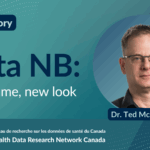Data NB: New name signals maturation as New Brunswick’s data steward


After 10 years as New Brunswick’s data steward, facilitating effective research and evidence-based decision making, DataNB has a fresh look and a new name. Formerly the New Brunswick Institute for Research, Data and Training, DataNB’s new moniker signifies a maturation and consolidation of roles within the health data landscape.
“We have become synonymous with data – whether it’s training data analysts, holding provincial data or providing data access for research – so the name change just made sense,” said founding director Dr. Ted McDonald, a member of HDRN Canada’s Executive Committee. Dr. McDonald recounted the vision of a retired deputy health minister who understood the value of administrative data collected in the routine functioning of government services and the need for an independent provincial data steward. “He saw an enormous amount of data being collected everywhere in government, and very little being done with it.”
We have been sponges absorbing the knowledge and expertise of other HDRN Canada members. Being part of a pan-Canadian network has allowed us to participate in larger multi-regional research projects that were out of reach before. That means New Brunswick residents are now part of national studies ~ Dr. Ted McDonald
Over the next five years, Dr. McDonald and champions in various corners of the provincial government worked tirelessly to lay the foundation for DataNB. They had seen what the Manitoba Centre for Health Policy, another HDRN Canada member, was doing and wanted to build something similar in New Brunswick. “We spent 2010 to 2015 reviewing best practices in Canada and internationally, creating policy documents, and supporting multiple changes to privacy legislation to allow us to exist and to be data holders in our own right,” he explained. “This was a shift from the way things had been done previously – to quote a former Deputy Minister, we weren’t setting policy based on conversations in the Tim Horton’s lineup,” he added.
DataNB received its first dataset of hospital records in 2014, prior to the official launch of the Institute. “It was hand delivered on a flash drive in a little bag. It was rather anti-climactic, considering the gargantuan effort required to get there,” Dr. McDonald recalled. Nevertheless, he saw great things in DataNB’s future. “I thought the floodgates would open but we quickly found out that most other data of interest, including key datasets such as the Medicare registry and physician billing, were covered by additional legislation that didn’t mention a research pathway to a data centre like ours.”
Dr. McDonald and his allies got to work once again and the resulting omnibus legislation, 2017’s Act Respecting Research, modified numerous other pieces of legislation such as the Family Services Act, the Medicare Act and the Clean Water Act to allow disclosure to our Institute for research purposes. “The legislation gave explicit permission to allow the government agency collecting those data to share with us in a linkable form.”
Additional pieces of legislation were modified in another Act Respecting Research in 2019, and the number of linkable datasets made available through DataNB continued to grow rapidly. “We collectively had the foresight to know that the data shouldn’t be limited to health data. Every government department collects data, but it’s difficult to share data across departmental silos. We made sure the legislation allowed us to access and combine data from multiple departments,” Dr. McDonald explained. “Now we have the ability to trace a person as they live their lives, from birth to death. We can link prenatal health services use to early childhood readiness to post secondary enrollment to income support data, for example, to better understand how government policies, programs and systems are performing.”
Linking multiple administrative datasets expands research possibilities, Dr. McDonald continued. “It allows for a more comprehensive understanding of complex issues from multiple data sources across various sectors, like health, education and workforce. The results are more robust, which enables evidence-based policymaking, cost-savings and system improvement.”
As a founding member of HDRN Canada, DataNB has been at the forefront of advancing multi-regional health research, which enables researchers to access population-level data from more than one province or territory. “We have been sponges absorbing the knowledge and expertise of other HDRN Canada members. Being part of a pan-Canadian network has allowed us to participate in larger multi-regional research projects that were out of reach before. That means New Brunswick residents are now part of national studies and are reflected in research findings where previously they were not included.” Membership in HDRN Canada has also provided DataNB with the opportunity to lead initiatives such as the network’s Privacy Team and CAN-ASK, a new data service for knowledge co-led with the Partnerships Team.
Learn more about how DataNB is facilitating effective research and decision making through data access and subscribe to DataNB’s newsletter.
